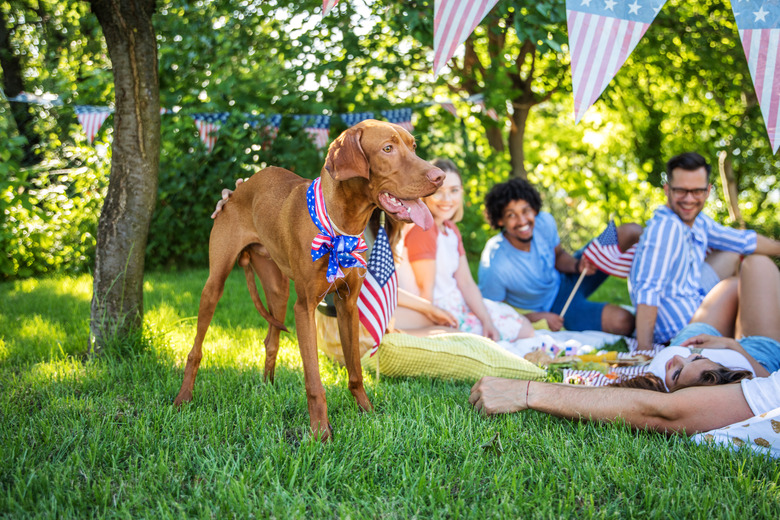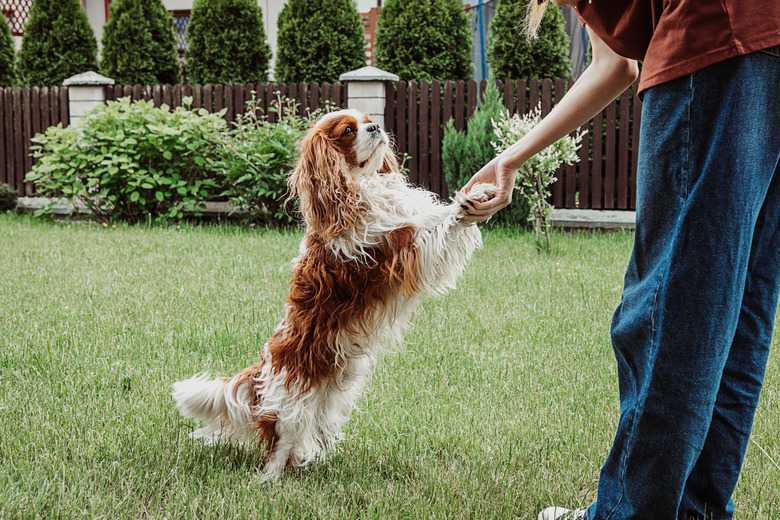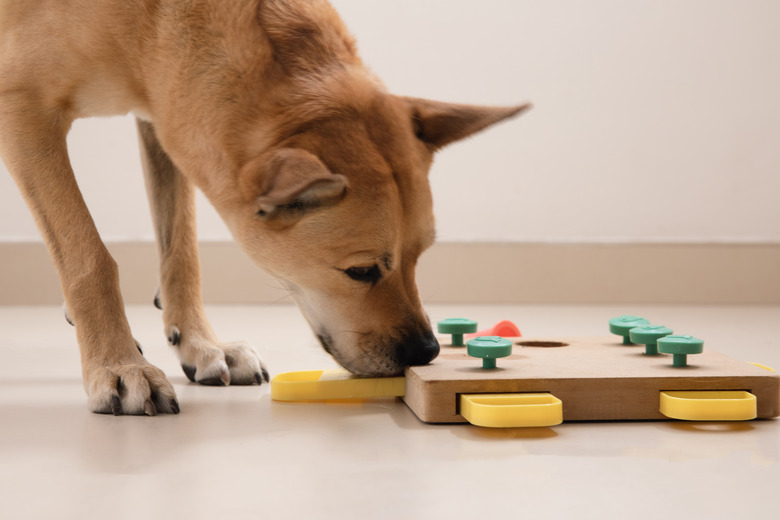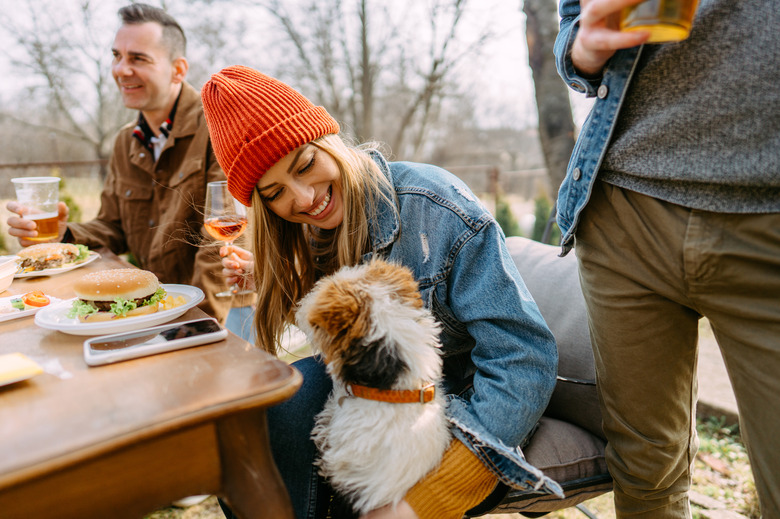Play These Easy Decompression Games To Help Keep Dogs Calm Around The 4th Of July
July 4th is stressful for most dogs. However, there are a variety of ways that you can support your dog during the holiday. One way to help decrease anxiety is to incorporate decompression games into your dog's routine. These types of games are activities that dogs can do that tap into a dog's natural instincts and abilities to self-soothe and decrease their stress. Decompression games can help a dog to form positive associations with fireworks.
What is a decompression activity?
What is a decompression activity?
Decompression activities are often misunderstood as being about distracting your dog from stressful things, such as loud noises. The activities are about tapping into your dog's natural calming and self-care instincts. Decompression games can help you make your home a safe space for your dog by providing naturally calming ways to reduce sound sensitivity and stress. These activities can also help prevent your dog from becoming fixated on the sounds of fireworks — by entertaining them.
Encourage calm on the 4th of July
Encourage calm on the 4th of July
For dogs who are experiencing stress and anxiety, it's important to encourage activities that can help them be relaxed. Decompression activities naturally encourage calm dog behaviors, which can shift your dog's overall mood. In general, behaviors that are reinforced are more likely to be repeated in the future, so it's helpful to encourage your dog to be doing activities that are relaxing for them. This produces calmer behaviors and reduces your dog's stress and fireworks anxiety. The goal is to calm your dog, not hype them up with rigorous play. Hyping your dog up can backfire and lead to more reactivity or anxiety about the loud sounds from fireworks.
Use snuffle mats for sniffing and foraging
A fun decompression game for dogs is to use snuffle mats. A snuffle mat has fabric or fleece strips that extend up off the base like an extreme shag carpet. Before giving the snuffle mat to your dog, you can mix your dog's treats and kibble into the fleece and fabric. These mats are a great way to tap into your dog's natural desire to sniff and forage. They are also a great way to feed your dog meals and help keep them relaxed.
Provide chewing toys and dog-safe bones
Chewing and gnawing are natural stress relievers for dogs. Chewing can help dogs to decompress from stressful experiences. When your dog is chewing on toys or dog-safe bones, be sure to supervise them while they are chewing. Make sure that your dog doesn't chew off small bits, which could be choking hazards. Also, when eatable bones become small, be sure to trade them out for newer and bigger ones.
Buy lick mats for your dog
Like chewing and foraging, licking is a calming activity for dogs. Lick mats are silicone or plastic mats or plates with a variety of textures and ridges. You can spread wet food, peanut butter, spray cheese, or any other soft dog-safe treats onto the mat for your dog to lick. Lick mats can keep dogs occupied for an extended period of time and encourage their self-soothing and calming behaviors.
Use puzzles and puzzle games
Puzzles are a great way to help decompress and relax your dog. Puzzles allow your dog to forage and get some quiet mental stimulation at the same time. You can purchase a wide variety of plastic and wood dog puzzles that are designed to have treats and kibble put inside. These puzzles challenge and stimulate your dog as they try to solve them. You can also make your own puzzles by reusing and upcycling cardboard boxes. Empty the boxes and hide treats or kibble inside. Then, show your dog the boxes or puzzles and allow them to explore and search for the treats. Another DIY puzzle option is to take an empty muffin tin and drop kibble or teats into some of the empty cup compartments. Then, place tennis balls into the muffin tin holes on top of the treats and give them to your dog to search for them.
Try food-dispensing toys
During the 4th of July, it's helpful to provide opportunities for your dog to decompress during mealtime. Kibble dispensing balls and toys can create a brain puzzle and foraging activity for your dog. These types of food dispensing toys release bits of kibble as your dog sniffs and pushes them around. This can help your dog to eat slower and be mentally and physically stimulating to them. For many dogs, eating out of a toy dispenser can help keep them engaged at mealtime and less focused on fireworks.
Early morning enrichment for dogs
Most fireworks get set off at night, so one strategy to give your dog some decompression time is to set an alarm and get up very early leading up to and during the holiday. Take your dog on long walks to prioritize sniffing. Give your dog the opportunity to explore at their own pace to decompress in advance of the fireworks. If possible, get to a quiet location without a lot of other dogs and people (especially if your anxious dog also struggles with reactivity). If it's safe, put your dog on a long-line leash and allow them to pick the direction of the walk.
Frozen activities for long-lasting decompression
If you know the fourth of July in your neighborhood is a long activity, it can be helpful to bring out long-lasting decompression activities. For dogs who are quick to solve puzzles, it can be useful to freeze some of them. Hard rubber toys like Kongs that can be stuffed with food and treats can also be frozen. Frozen food-stuffed toys take a much longer time for dogs to solve and can keep dogs engaged for a longer period. Water-moistened kibble, bone broth, wet food, and peanut butter can all be frozen.
Be proactive ahead of the 4th of July
Be proactive ahead of the 4th of July
Try to prep your dog's decompression activities in advance of the holiday. Instead of just waiting for the fireworks to start, stock up on your dog's favorite chews and pre-stuff Kongs, and treat-dispensing toys. Some people also set off fireworks in the days leading up to July 4th, so it's helpful to have some decompression games prepped a few days in advance. This will allow you to start giving your dog puzzles, and other decompression activities before the fireworks start. Be sure to prep enough activities to continue to trade them out for something new as fireworks continue.
Get support from your veterinarian
Get support from your veterinarian
Although decompression games can help dogs form positive associations with fireworks, they are not a treatment for severe fireworks anxiety. Decompression games can foster calmness in dogs and even reduce anxiety. However, if your dog continues to struggle with panic around fireworks, (and other over-the-counter supports like thundershirts aren't helping) it's important to talk with your dog's veterinarian about options for anti-anxiety medication support.
In summary
In summary
Decompression activities aren't just for distracting your dog during fireworks. They can also help your dog to self-soothe, relax and refocus. It's helpful to provide your dog with a variety of enrichment experiences leading up to and during the fourth of July holiday. Decompression activities use your dog's natural instincts like sniffing, chewing, licking, and foraging — to entertain, enrich and reduce your dog's stress.



